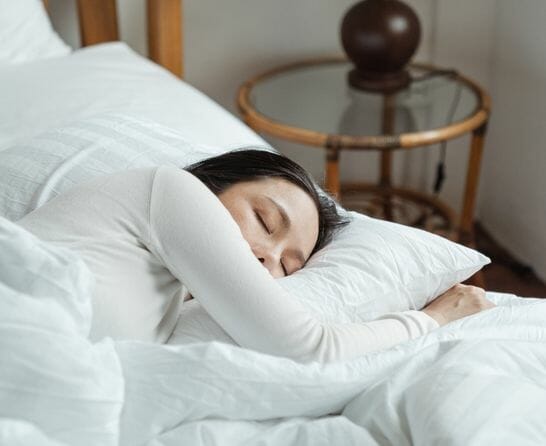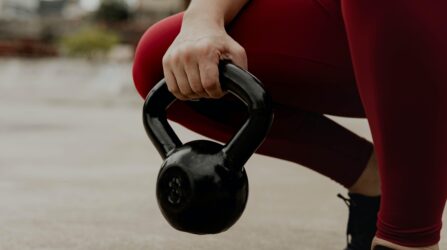-
Written by Jenny Donath

Gang, we’ve all been there. Laying awake, desperate for sleep as you watch the hours tick by… No matter what you do, you cannot fall asleep. But you don’t have to suffer. Whether it’s stress, shift work, or just Sunday Night Sleeplessness, we can help you find that snooze zone…
Trouble dropping off?
Generally speaking, drifting off shouldn’t take you longer than 20 minutes, although even a 30-minute drop-off time is entirely usual. However, if you’re lying awake for more than 45 minutes a night, that might indicate a deeper issue is keeping you from the land of nod.
And if that’s the case, here are some fab ways to help encourage snoozing.
If you can’t fall asleep…
Here are some top tips for relaxing and nodding off in no time:
Avoid carbs before bed
Have you ever had a big bowl of pasta right before falling into bed and then woken up with a heavy feeling in your stomach? That’s thanks to all the carbs — your body takes longer to digest them, which will affect your sleep quality if you throw carbonara into your face at midnight.
To make sure you wake up feeling tip-top, avoid carb-rich food two or three hours before bedtime. That way, your body gets enough time to digest the meal before you’re unconscious.
Hydration
Drinking water throughout the day is important, as dehydration can lead to sore muscles and headaches. Both of which will make it incredibly hard for you to fall asleep. Make sure you have a glass of water before bed, and keep one nearby in case you wake up during the night.
Sunshine
Daylight is crazy important for your physical and mental health. But it also affects your internal clock. If you work in an office without windows or in the basement, or on night shifts, make sure that you get outside at some point during the day and give your body a chance to experience natural light. It’ll make sleeping much easier.
Take a hot bath or shower
Now, we’ve all gotten out of a hot bath and felt the overwhelming need to nap. And that’s down to two things. The first is the extreme relaxation you get from luxuriating in hot water, with or without bubbles, candles, and the like. And the second is related to your need to cool down after raising your temperature, and napping is a great way to do that.
You’re probably way ahead of us here, but taking a hot shower or bath around a couple of hours before bed could help you fall asleep more easily.
Don’t check the time
Have you ever woken up in the middle of the night and checked the time, realising you only have two hours left before it’s time to get up? And once you start hearing that ticking in your head, falling asleep is almost impossible, leaving you stressed and restless. We know this sounds obvious but, don’t check the time. You’ll know when it’s time to get up. And you might sleep better.
Supplements
If you’re struggling, there are some supplements that can help increase your sleep hormones and create the ideal brain activity for sleep. They include Magnesium, Vitamin B12, and Melatonin.
Herbal supplements like CBD, as well as Camomile and Lavender teas can also have a calming effect and make you fall asleep faster. Their essential oils can also stimulate your senses with the help of a humidifier… We swear by Lavender oil in ours — it’s heavenly.
Aromatherapy
Aromatherapy is a fantastic way to improve your sleep quality. Exposing yourself to the relaxing scents of damask rose, lavender, or peppermint might well get you all snoozy. And sleep sprays are a great way to immerse yourself in amazing smells. So, snuggle into your pillow and breathe in deeply…
Music
Listening to anything that gets you in the right headspace for sleep is something we very much recommend. Be that classical, ambient, trip-hop, mystical, or even white noise, lose yourself in the sounds of sleep.
Don’t force it
If you lie awake for too long, get up and do something else. Try journaling to get your thoughts out, listening to a podcast, or going for a walk, where safe, natch. Low-energy activities can have a relaxing effect and take your mind off not being able to sleep.
Believe it or not, trying to stay awake makes falling asleep easier than forcing yourself to fall asleep. Who knew?
Sex and masturbation
Last but not least, this might be our favorite tip of all! Whether alone or with others, sex is the go-to method if you struggle to fall asleep, especially if you’re able to reach orgasm. The release of oxytocin will make you reeeally sleepy and likely to drift off within minutes. So, what better way to end your day than with some naughty time?
In the end…
Falling asleep isn’t always easy, so find what works best for you. And remember, even the Dalai Llama sometimes has trouble nodding off. What we’re saying is, nothing is 100% perfect. But the more you practice, the better it’ll get. May we suggest tracking your success with the amazing Hormona app? You can record your symptoms and how you’re dealing with them and we’ll tell you all about how your hormones are behaving — deal?
Disclaimer: This website does not provide medical advice. The information, including but not limited to, text, graphics, images, and other material contained on this website is for informational purposes only. No material on this site is intended to be a substitute for professional medical advice, diagnosis, or treatment. Always seek the advice of your physician or other qualified healthcare provider with any questions you may have regarding a medical condition or treatment and before undertaking a new healthcare regimen, and never disregard professional medical advice or delay in seeking it because of something you have read on this website.

-


Dr Singh is the Medical Director of the Indiana Sleep Center. His research and clinical practice focuses on the myriad of sleep.




